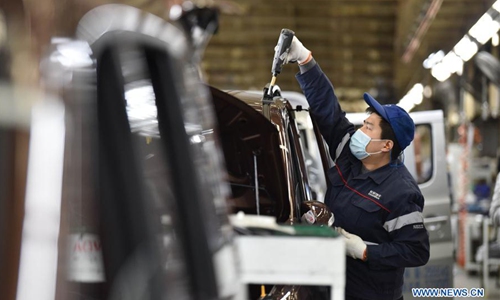HOME >> OPINION
Five battles that China must win in 2020
By Wang Wen Source:Global Times Published: 2020/2/17 20:46:30

A worker operates at the factory of Chang'an Automobile in Dingzhou, north China's Hebei Province, Feb. 16, 2020. Companies in Dingzhou resumed production with epidemic prevention measures during the outbreak of the novel coronavirus. (Xinhua/Zhu Xudong)
The 2020 Spring Festival might be the most difficult and unforgettable Chinese New Year since the launch of the reform and opening-up four decades ago. The whole country has spent this year's holiday as if it were wartime. Chinese decision-makers have used the word "war" to inspire people's morale and mobilize national resources, stressing the need to resolutely win the people's war against the novel coronavirus pneumonia (NCP).
A few days ago, Bosnian politician Zlatko Lagumdžija sent me a video, in which he hoped to express, via me, his support to Chinese society. His words touched me: "Today you are on the first line of global defense of humanity under the grim shadow of the novel pandemic."
China's decision-making and deployment of vast resources have managed the NCP in a relatively controllable process, which has prevented more deaths and widespread infection worldwide. China's difficult period may continue for a while and more battles are still to come. Chinese people must have the confidence to win five battles before truly ending this difficult period of 2020.
First, the battle against the coronavirus. At present, the scale and speed of China's response to the NCP has far exceeded that of the 2008 Wenchuan earthquake. The World Health Organization has warned that the world must consider the coronavirus "public enemy number one." Many experts of infectious diseases believe that the NCP may not be completely eradicated. This means that China needs to normalize its epidemic prevention efforts. China needs to ensure the orderly resumption of work, and put the virus' spread under control. By locking down Wuhan, a city with a population of about 11 million that is at the epidemic center in Central China's Hubei Province, China has made great sacrifices to prevent the virus from spreading beyond its borders. China will continue to contain the spread of the virus, diagnose its pathology, find effective medicine and eventually win this battle.
Second, the battle for economic recovery. China's consumption, production and trade are being greatly impacted by the epidemic. Many economists predict that the country may witness its weakest GDP growth rate since 1990, which might slow to 3.5 to 5 percent in the first quarter due to the hit by the epidemic. China's ministries and local authorities have carried out hundreds of policy initiatives in an attempt to strike a balance between the normal operation of enterprises and the prevention and control of the epidemic.
It is generally believed that the fight for economic recovery will kick in China in the second quarter of 2020. Many institutions are optimistic about China's economic growth in the third quarter, believing there will be irreversible rebound.
Third, the battle to safeguard people's livelihood. The epidemic has caused serious harm to the lives and health of the Chinese people. The short-term economic recession will hurt the interests of low- and middle-income Chinese. The impact on the middle class can also not be ignored. The goal of totally eradicating poverty by 2020 will be harder to achieve. Yet raising people's living standards is the aim of the Communist Party of China. It is an urgent battle to recover the losses the epidemic has inflicted on the Chinese people. The recovery is being facilitated through medical, financial, taxation and other measures.
The fourth is the battle of public opinion. During China's fight against the epidemic, the governments of many countries and their people have donated medical supplies to assist and support China. Meanwhile, there are also some Western media and scholars accusing, smearing, and even discriminating against China, calling the country a "disease incubator" and "real sick man of Asia," in the name of freedom of speech.
Many people regard such rhetoric as another kind of virus, or verbal cannonballs, attacking China on a new frontline. These attacks reflect the prejudice, arrogance and brutality of some Westerners, and present their conceit and hostility toward China. This is a fierce battle for public opinion.
The fifth battle is the US-launched trade war against China. The outbreak has affected the implementation of the phase one trade deal. It has even accelerated the "decoupling" of the two countries. The mutual strategic trust between China and the US remains limited. With the approaching US presidential election, the subject of China will undoubtedly spark heated debates. The possibility cannot be ruled out that the China-US trade rivalry - post phase one trade deal - will be even more intense.
Describing China's state of overcoming tough challenges in 2020 with words such as "battle" and "war" does not indicate the Chinese people are aggressive. It expresses their awareness of the difficulties and their determination to settle them. China hasn't resorted to force or launched a war in four decades. This is due to not only China's foreign policy, which underlines peaceful development, but also the peace-loving culture of modern Chinese people, and their willingness to combat complicated issues by non-military means. From a grander perspective, the battle of the epidemic is part of the "protracted war" of China's rise.
In the face of the plight of 2020, I believe China and the Chinese people will prevail!
The author is professor and executive dean of Chongyang Institute for Financial Studies at Renmin University of China, and executive director of China-US People-to-People Exchange Research Center. His latest book is Great Power's Long March Road. wangwen2013@ruc.edu.cn
Posted in: COLUMNISTS,VIEWPOINT